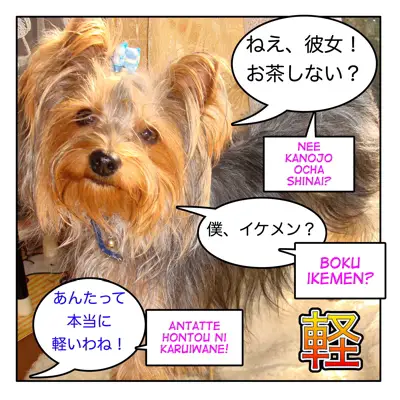
Cookie : 「ねえ、彼女、お茶しない?」
= Nee kanojo, ocha shinai?
= Hey baby, wanna have a cup of tea with me or something?
「僕、イケメン?」
= Boku ikemen?
= “Am I cute?”
![]() 「あんたって本当に軽いわね!」
「あんたって本当に軽いわね!」
= Antatte hontou ni karuiwane!
= “You are a shallow playboy! “
We are going to study this kanji today!
 軽 = かるい・かる・がる・けい = karui, karu, garu/kei
軽 = かるい・かる・がる・けい = karui, karu, garu/kei
• 軽い ( = karui) light, soft, insignificant, mild, minor, easy, simple
Ex. 旅行の荷物は軽い方がいい。
= Ryokou no nimotsu wa karui hou ga ii.
= Pack light when you travel.
• 軽自動車 ( = kei jidousha) mini vehicle (light automobile)
• 軽量 ( = keiryou) light weight
Ex. 軽量の傘
= keiryou no kasa
= light weight umbrella
• 軽食 ( = keishoku) snack
• 軽々しい ( = karugarushii) thoughtlessly
• 軽口を叩く ( = karuguchi wo tataku) to crack a joke
• 軽い食事 ( = karui shokuji) light snack
•「軽くなんか食べようか?」
= Karuku nanka tabeyou ka?
= “Do you wanna go grab something light?”
• 命を軽く扱ってはいけない。
= Inochi wo karuku atsukatte wa ikenai.
= Don’t brush away one’s life.
• 軽視する ( = keishi suru) to disdain
• 彼に打ち明けて、気持ち/心が軽くなった。
= Kare ni uchiakete kimochi/kokoro ga karuku natta.
= After I confessed to him, I felt much lighter.
• 彼は難問を軽く解いていた。
= Kare wa nanmon wo karuku toite itta.
= He solved the difficult problems easily.
• 腰が軽い ( = koshi ga karui) ↔ 腰が重い ( = koshi ga omoi)
(Note: Go check 重い ( = omoi) lesson!)
to be ready to act or to be ready to do things for others quickly and without any hesitation
Ex. 彼は腰が軽いから何でもやってくれる。
= Kare wa koshi ga karui kara nandemo yatte kureru.
= He is always ready to do things for others so he will do anything for you.
• 口が軽い ( = Kuchi ga karui.) to have a loose tongue, unable to keep a secret
Ex.「マギーは口が軽いから気をつけて。」
= Maggie wa kuchi ga karui kara ki wo tsukete!
= Be careful! Maggie has a big mouth.
• 身軽 ( = migaru) to pack light, move easily
Ex. 身軽に旅行に出かける
= Migaru ni ryokou ni dekakeru.
= to travel light
• 手軽 ( = tegaru) easy and simple, handy
Ex.手軽な料理 ( = tegaru na ryouri) easy (simple) cooking
Ex. ラーメンは手軽に作れます。
= Ramen wa tegaru ni tsukuremasu.
= You can cook ramen very easily
• 軽々しい ( = karugarushii ) imprudently, indiscreet, thoughtless
Ex.「軽々しく言わないで。」
= Karugarushiku iwanai de.
= Don’t say that so lightly! (as if you are not even thinking about it!)
• 軽卒 /軽はずみな ( = keisotsu/ karuhazumi na) hasty
Ex.軽卒な/軽はずみな 行動は慎んで下さい。
= Keisotsu na/ karuhazumi na koudou wa tsusushinde kudasai.
= Don’t act so hastily!
 Focus!!! ( From Today’s picture above!)
Focus!!! ( From Today’s picture above!)
 •彼は軽い。( = Kare wa karui.)
•彼は軽い。( = Kare wa karui.)
It means :
He is a playboy/ superficial / flirtatious / with no substance
•「すぐにデートに応じたら軽い女に思われるよ!」
=Sugu ni deito ni oujitara karui onna ni omowareru yo!
= If you answer “yes” too quickly when he asks you out, he might think you are easy.
• 軽過ぎる男には要注意!
= Karusugiru otoko niwa youchuui!
= Be careful of superficial guys!
• 軽い女 ( = karui onnna) slut, bimbo
• 尻軽女 ( = shirigaru onnna) slut, loose woman
<Slang!!>
A slang for 軽い男 ( = karui otoko) is :
 チャラ男 ( = Charao)
チャラ男 ( = Charao)
a shallow, superficial or flirtatious guy who always tries to pick up girls.
It came from チャラチャラした(男)( = charachara shita (otoko)) or チャラい(男 )( = charai (otoko))
チャラチャラ (=charachara) is a sound of accessries that they wear, such as ear rings or necklaces or their showy outfits.
「チャラチャラするな!」
= Charachara suruna!
= “Don’t wear those or behave like a shallow guy!”
チャラい (or チャらい)( = charai) is an adjective.
This word is not that new but we have started to hear often since 2010 linking the image of 藤森 ( = Fujimori) of a comedian duo オリエンタルラジオ ( = Orientaru rajio ) = Oriental Radio, because of the way he talks is very チャラい( = charai ) . (You will see in the video below.) and he has a reputation as a “shallow” playboy.
 「ねえ、彼女、お茶でもしない?」
「ねえ、彼女、お茶でもしない?」
= Nee, kanojo, ocha demo shinai?
=”こんにちは赤ちゃん、んえーいお茶ものとして何かな?”
これは日本の典型的なピックアップラインです。 誰も実際にお茶を飲むつもりはありません。 しかし、彼らはとにかくそれを言う。
また”(と)ばばない!”
(=(ボクト)アソバナイ?)
“あなたは私と一緒にたむろしたいですか? “
「どこか遊びに行かない?”
=ドコカアソビニイカナイ?
=”どこかに遊びに行きたいですか?”
も典型的なピックアップラインです。
a pick-up = ナンパ ( = nanpa)
to pick up (somebody) = (~を)ナンパする (=~wo nanpa suru.)
 「僕、イケメン?」
「僕、イケメン?」
= Boku ikemen?
= “Am I cute?”
イケメン ( = Ikemen) is a slang and it means a cute guy.
「あんたって本当に軽いわね!」
=Antatte hontou ni karuiwane!
= “You are a shallow playboy! “
あんた:more casual than あなた ( = anata)
~わね。( = wane) Women use this ending.
 マギー先生より = Maggie sensei yori = From Maggie sensei
マギー先生より = Maggie sensei yori = From Maggie sensei